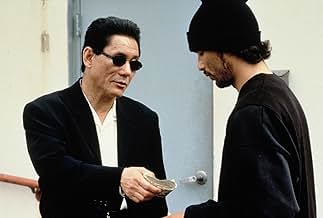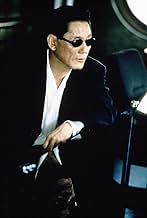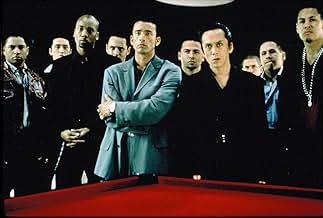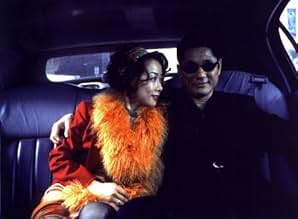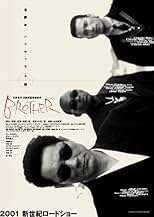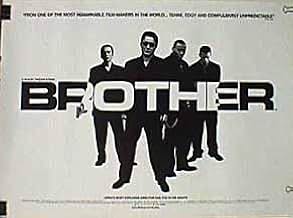En rupture avec son gang, Yamamoto s'exile à L.A., USA. Il y retrouve un frère américanisé, dealer à la petite semaine dans une bande. Le Yakusa constate qu' un 'milieu' aussi minable est bo... Tout lireEn rupture avec son gang, Yamamoto s'exile à L.A., USA. Il y retrouve un frère américanisé, dealer à la petite semaine dans une bande. Le Yakusa constate qu' un 'milieu' aussi minable est bon à ramasser. Il convertit vite fait ces voyous au Made in Japan. [255]En rupture avec son gang, Yamamoto s'exile à L.A., USA. Il y retrouve un frère américanisé, dealer à la petite semaine dans une bande. Le Yakusa constate qu' un 'milieu' aussi minable est bon à ramasser. Il convertit vite fait ces voyous au Made in Japan. [255]
- Récompenses
- 1 victoire et 1 nomination au total
- Aniki Yamamoto
- (as 'Beat' Takeshi)
- Ishihara
- (as Ryo Ishibashi)
- Latifa
- (as Tatyana M. Ali)
Avis à la une
cheers
Brother is not quite his best film, but you will realize that the focus is not on the story but on the themes of its story. Completely unlike its characters, especially Takeshi's stone cold killer, its story is something to feel your way through. These characters do not feel much. They do. The movie is mostly made up of deadpan scenes of bloody violence, occasional dialogue, and quiet medium closeups. The music, which like in all Takeshi films is lush and emotional, directs our feelings.
Brother is great for fans of crime movies, gangsters, violence overall, Asian cinema, and even action fans, but Takeshi Kitano's style is a strangely deadpan and very personal approach. It's an acquired taste.
But the core, unmissable qualities of a Kitano film remain. Takeshi Kitano must be the natural successor to Clint Eastwood as an anti-hero. Most of the stylised violence takes place off-screen, with a flash of humour, then the after-effects vividly on display. The sound-track from Joe Hisaishi matches the screen action perfectly, at times an aggressive supplement to the violence, at other times hauntingly peaceful.
The ending is the film's weakest part, as though Kitano pandered to imagined (or real) American requirements. The out-of-town setting and road movie elements fit uncomfortably with the rest of the film. But if this is the compromise needed to get Kitano to make more films out of Japan, it must be worthwhile.
I enjoyed this movie a lot. I'm not entirely sure why. I think mostly it was just plain fun. 'Beat' Takeshi was just brilliant in the role of Aniki. It's a sign of a great actor when he can command your attention without really doing anything.
I loved its thoughtful pace and purpose, and how there was a real symmetry in the story. In terms of introduction of the characters and their interactions, the story closes in reverse really nicely. I won't say much more, as I don't want to spoil it; it's not major, just nicely done.
All in all, I highly recommend it. It's quite violent at times, but if you're okay with that (and hell, perhaps even like it in a Kill Bill kind of way) then definitely check this out.
Le saviez-vous
- AnecdotesThis was Takeshi Kitano's only American film he ever made. In an interview, Kitano said that he did not like the final result of Brother and that he regretted his "Hollywood adventure", which was supposed to bring him a wider audience. As a result, Kitano said that he had no intention of filming outside Japan again.
- Citations
Aniki Yamamoto: I understand "fucking Jap," asshole!
- Versions alternativesUS version was heavily cut for violence to be in accordance with MPAA demands for a "R" rating.
Meilleurs choix
Détails
- Date de sortie
- Pays d’origine
- Site officiel
- Langues
- Aussi connu sous le nom de
- Brother
- Lieux de tournage
- Sociétés de production
- Voir plus de crédits d'entreprise sur IMDbPro
Box-office
- Budget
- 10 000 000 $US (estimé)
- Montant brut aux États-Unis et au Canada
- 450 594 $US
- Week-end de sortie aux États-Unis et au Canada
- 60 029 $US
- 22 juil. 2001
- Montant brut mondial
- 15 250 594 $US
- Durée
- 1h 54min(114 min)
- Couleur
- Mixage
- Rapport de forme
- 1.85 : 1


